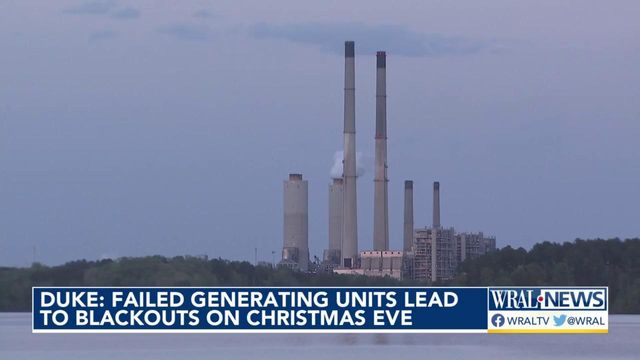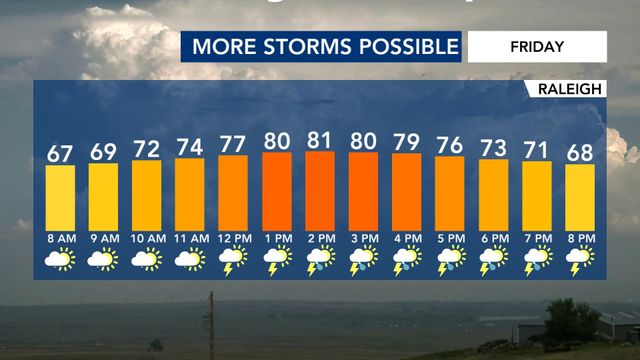Duke Energy acknowledges multiple generators failed, despite promise they were fully prepared for extreme cold
Duke Energy now admits several generating units were either offline or not responding during the rolling blackouts Christmas eve.
Last summer, Duke Energy claimed to be ready for extreme cold. Now, they're saying multiple generators did not respond ahead of rolling blackouts that impacted half a million people over the weekend.
Duke Energy initially blamed colder-than-expected temps and higher-than-expected demand, but experts agree that would not be enough to cause the widespread "load-shedding" the utility implemented on Christmas Eve.
After the 2021 winter blackout in Texas that killed more than 200 people, regulators in North Carolina required utilities to report on their winter weather preparedness. Duke testified as recently as this summer that it was fully prepared for extreme cold, had not had generators fail to respond in the past three winters, and had a "robust" plan to alert consumers if rolling outages were ever needed.
So what happened?
Chris Carmody, who works in the energy industry with the Carolinas Clean Energy Business Association, says he was surprised when rolling outages hit without warning early Christmas Eve morning.
"Everybody in the country knew one to two weeks in advance what temperatures we were going to have, and where we were going to have them," he says. "This is really Duke Energy's job, to model and to prepare correctly, so that we don't have problems like this."
At the time, Duke Energy said demand was a little higher than expected and the weather was a little colder – but now we’re now learning multiple generating units did not respond when they were called on for extra power.
Duke spokesman Jeff Brooks did not have details on which units failed to respond.
“We did have some reduced power generating capacity, and were challenged in our ability to secure additional power from outside of our service area due to all utilities in the region dealing with similar challenges from the extreme cold," said Brooks.
NC Utility Commission attorneys who represent energy consumers, known as the Public Staff, confirmed that multiple generating units were offline or not responding at the time of the outages. They did not have details on the exact number of units affected or what percentage of Duke’s generating capacity they represented.
Duke Energy told regulators it had a plan to keep customers informed if rolling blackouts were needed. They even had social media posts ready. But there was no advance notice to customers before the outages started.
Energy utility expert Liza Reed, a research analyst with the nonprofit Niskanen Center, says that probably means Duke Energy was caught off-guard, too, and needed to move quickly to avoid a much worse outcome.
"The reason that you do rolling blackouts is that the electricity grid depends on power being consumed as soon as it's generated, essentially. If you don't – if either one of those is off – it actually throws off the system stability, and the grid can collapse, and that's very difficult to recover from. That can take days to recover from," Reed said. "I'm guessing the utility saw their generation drop and sort of needed to immediately respond."
Despite some critics, renewable energy wasn't to blame
When rolling power outages hit without warning last weekend, critics of efforts to cut carbon emissions were quick to blame renewable energy.
“The government’s force-fed green energy transition is creating systemic vulnerabilities,” claimed the Wall Street Journal’s editorial board.
But that’s not what happened in North Carolina. Matt Abele with the NC Sustainable Energy Association says the transition to green energy is just getting underway here.
"We haven't seen a large increase in renewables yet on the grid. So in North Carolina, we're still heavily dependent upon coal, natural gas, other fossil fuel resources, and we're still having some of these issues," says Abele.
Chris Carmody leads the Carolinas Clean Energy Business Association. His group is one of several at odds with Duke over the transition to cleaner energy.
"It wasn't renewables that failed. And they're a tiny, tiny percentage of the grid," says Carmody.
He believes the problem may have been more serious than Duke Energy is saying.
"The public deserves to know what was down and why," Carmody says. "Duke made $18 billion last year in profit, I think, and paid no or essentially no federal income taxes. So it's not as if Duke is under-resourced. I mean, this is their job as a government monopoly."
Duke Energy has told state regulators renewable are unreliable, so it will need to build more gas power plants to maintain the stability of the grid.
"Duke sort of uses reliability like a cudgel to sort of fight renewables as an option. And this really is ironic, that, you know, their system failed with their own projections, they have complete control of it, and it was likely gas generators that failed," says Carmody.
In a statement on Wednesday evening, Brooks responded that even with some generators offline, Duke believed they had enough generating capacity to cover the demand. But when demand was higher than expected, Brooks said the utility was unable to get power from neighboring states who were also experiencing extreme cold.
The state utilities commission has asked Duke Energy for a briefing on the outages.
They're expected to get that report at a meeting next Tuesday.













